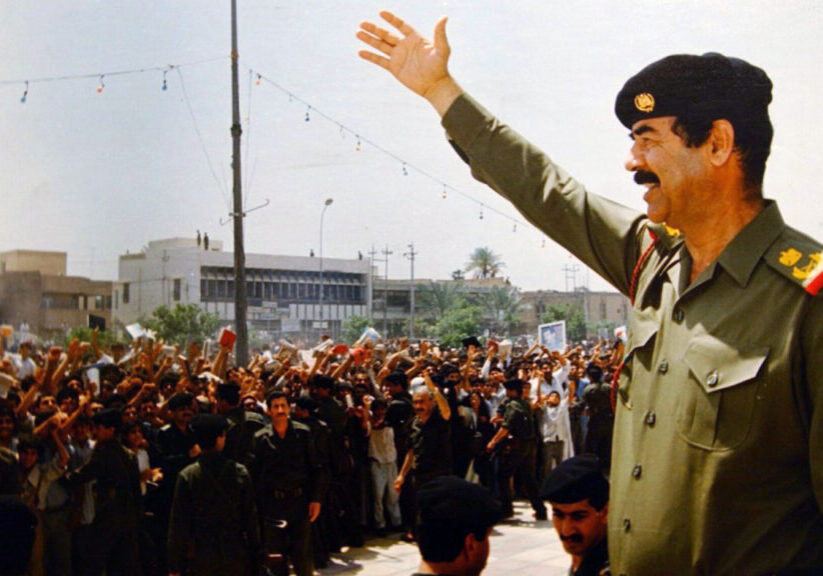Australia/Israel Review
Essay: The Case for Democracy
Mar 1, 2005 | External author
Ten reasons to support democratisation in the Middle East
By Victor Davis Hanson
 |
| The Iraqi electoral revelation has not gone unnoticed by its neighbours |
Neoconservatives hope that a democratic Iraq and Afghanistan can usher in a new age of Middle Eastern consensual government that will cool down a century-old cauldron of hatred. Realists counter that democratic roots will surely starve in sterile Middle East soil, and it is a waste of time to play Wilsonian games with a people full of anti-American hatred who display only ingratitude for the huge investment of American lives and treasure spent on their freedom. Paleoconservatives prefer to spend our treasure here at home, while liberals oppose anything that is remotely connected with George W. Bush or refutes their own notions of a world to be adjudicated by a paternal United Nations. All rightly fear demonocracy – the Arafat or Iranian unconstitutional formula of “one vote, one time.”
Yet for all its uncertainties and dangers in the Islamic Arab world, there remain some undeniable facts about democracy across time and space that suggest with effort and sacrifice it can both work in the Middle East and will be in the long-term security interests of the United States and its allies. So why exactly should we support the daunting task of democratising the Middle East and how is it possible?
1. It is widely said that democracies rarely attack other democracies. Thus the more that exist in the world – and at no time in history have there been more such governments than today – the less likely is war itself. That cliche proves, in fact, mostly true. There are gray areas of course in such blanket generalisations: The Confederates, British, Boers, and Prussians all had parliaments of sorts, but were clearly not as democratic as their adversaries in 1861, 1812, 1899, and 1914. While modern forms of democracy are sometimes hard to define, we more or less know them when we see them: All citizens are eligible to vote and hold office, a free press flourishes, and the rule of constitutional law trumps fiat. Thus should Iraq become a true constitutional government, it is less likely to invade a Kuwait, pay subsidies to suicide murderers, send missiles into Israel and Saudi Arabia, or gas its own people.
2. More often than not, democracies arise through violence – either by threat of force or after war with all the incumbent detritus of humiliation, impoverishment, and revolution. The shame of the Falklands debacle brought down the Argentine dictatorship in the same manner that Portugal’s imperial disasters in Africa steered it from fascism to republicanism. Japan, Germany, and Italy arose from the ashes of war, as did South Korea and in a sense Taiwan as well.
Most likely Ronald Reagan’s arms build-up of the 1980s bankrupted the Soviet Empire and freed both its “republics” and the enslaved states of Eastern Europe. So the birth pangs of democracy are often violent, and we should pay little attention to critics who clamor that the United States cannot prompt reform through regime change. Instead, let skeptical Americans (who were not given their own liberty through debate) adduce evidence that freedom is usually a result of mere petition or always indigenous. Even the Philippines and South Africa were the dividends of diplomatic strong-arming, the cessation of US support, and veiled threats that continued autocracy would lead to disaster.
3. Democracies are more likely to be internally stable, inasmuch as they allow people to take credit and accept blame for their own predicaments. They keep their word, or as Woodrow Wilson once put it, “A steadfast concert for peace can never be maintained except by a partnership of democratic nations.”
A Hitler, Mussolini, Shah, or Pinochet can hijack for a time weak democracies, but they offered no real improvement and only led the people to disaster. Some in desperation talk of the need for a “good” Saddam-like strongman to knock a few heads in the Sunni Triangle – but that vestigial idea from the Cold War would only bring a few months or years of stability at the price of decades of unrest. Sooner or later every people has a rendezvous with freedom.
4. The democratic idea is contagious. We once worried about the negative Communist domino theory, but the real chain reaction has always been the positive explosion of democracy. Once Epaminondas curbed Spartan autocracy, suddenly Mantinea, Megalopolis, and Messenia went democratic and the entire Peloponnese began to adopt consensual governments. When Portugal and Spain flipped, it had an enormous positive effect on moving change forward in the Spanish-speaking world of Latin America – as liberty spread, once-right-wing Chile and left-wing Nicaragua were freed. The Soviet republics and Eastern European satellites without much warning imploded in succession – more quickly even than the Russians had once enslaved them in the late 1940s.
It is not a neocon pipedream, but historically plausible that a democratic Israel, Palestine, Turkey, Afghanistan, and Iraq can create momentum that Egypt, Saudi Arabia, Lebanon, and eventually even a Syria or Iran would find hard to resist. Saudi Arabia’s ballyhooed liberalisation, Mubarak’s unease about his successor, Libya’s strange antics, Pakistan’s revelation about nuclear commerce, and the Gulf States’ talk of parliaments did not happen in a vacuum, but are rumblings that follow from fears of voters in Afghanistan and Iraq – and a Mullah Omar dethroned and Saddam’s clan either dead or in chains.
5. In the case of the Muslim world, there is nothing inherently incompatible between Islam and democracy. Witness millions in India, Malaysia, Indonesia, and Turkey who vote. Such liberal venting may well explain why those who blow up Americans are rarely Indian or Turkish Muslims, but more likely Saudis or Egyptians. The trick is now to show that Arab Muslims can establish democracy, and thus the Palestine and Iraq experiments are critical to the entire region.
6. Democracy brings moral clarity and cures deluded populaces of their false grievances and exaggerated hurts. The problem in the Middle East is the depressing relationship between autocracies and Islamists: Illiberal governments fault the Americans and Jews for their own failure. Thus in lieu of reform, strongmen deflect popular frustration by allowing the Wahhabis, al Qaedists, and other terrorists to use their state-controlled media likewise to blame us rather than a Mubarak, Saudi Royal Family, or Saddam Hussein. Yet just as crowded Germans today do not talk of the need for lebensraum and resource-less Japanese have dropped dreams of a Greater Co-Prosperity Sphere, so too a democratic Middle East will more likely look inward at tribalism, patriarchy, fundamentalism, religious intolerance, and polygamy rather than automatically at Israel and the United States when their airliners crash or a car bomb goes off.
7. We fret rightly about the spread of weapons of mass destruction. But the truth is that we worry mainly about nukes in the hands of autocracies like China, Iran, or North Korea. No American loses sleep that the UK or France has deadly missiles. A Russia that used to paralyse American foreign policy by virtue of its atomic arsenal poses little threat as long as President Putin can be persuaded not to destroy his consensual government. We should of course try to keep the number of nuclear nations static. Yet the next-best course is to ensure that Pakistan or China can evolve into free societies, and hope that should Iran obtain such weapons, its mullahs can be overthrown and their successors can follow the course of a South Africa whose new democracy dismantled its inherited arsenal. We cannot expect a successful democratic Germany or Japan to sit back and watch criminal states like Iran and North Korea go nuclear without expecting them to do the same – thus the need now to support democratic agitation in Tehran and elsewhere.
8. The promotion of democracy abroad by democracy at home is internally consistent and empowers rather than embarrasses a sponsoring consensual society. All sensible Europeans and Americans eventually ask themselves why freedom is fine for us but not for others. And if the novel orthodoxy of the post-Cold War era demanded that democracies must cease their support for rightist thugs, the subsequent wisdom is that they should be even more muscular, actively supporting democratic change rather than postfacto politely clapping after its establishment.
9. By promoting democracies, Americans can at last come to a reckoning with the Cold War. If it was wrong then to back a Shah or Saudi Royal family (“keep the oil flowing and the Commies out”) or to abandon Afghanistan after repelling the Soviets, it is surely right now not to repeat the error of realpolitik – especially when there is no longer the understandable excuse of having thousands of Soviet nuclear weapons pointing at the heart of America. Since 1946 the United States has had to check the Soviet Union, attempt to save millions from its state slavery, and then liberate its subjects. That messy and brutal task is mostly accomplished, and now we can at least attempt to provide freedom to those states in the past we once neglected.
10. Like it or not, a growing consensus has emerged that consumer capitalism and democracy are the only ways to organise society. We are not at the end of history yet – wars and revolutions may well plague us for decades. But if we cannot achieve universal democracy, we can at least get near enough to envision it. I doubt whether George Bush’s vision of ending tyranny in our lifetime is possible, but he is to be congratulated for grasping that in our lifetime most of the world agrees that it should be. The Arab world so far has missed the bus of history. The success of democratic reform in parts of Africa, Latin America, and Asia is a daily reminder of the decades lost in the Middle East, and how endemic Arab envy, jealousy, and excuses – which so repel or bore the world – can be ameliorated only by a new maturity and responsibility that are the wages of democratic government.
Democracy is not faultless. The Left sees it as selfish individualism at the expense of equality of result – a desired egalitarianism that can only be achieved by undemocratic government coercion. The extreme Right at best sees democracy as a devolving concept of dumbing society down to its lowest common element – Plato’s notion that eventually even the animals would be given equality – as a prelude to the rule of the rabble.
In response, our politicians and pundits constantly try to fine-tune democracy, to tinker with voting, redistribute wealth, turn to legislative plebiscites, gerrymander, and use the courts to trump popular sovereignty. Ancient political thinkers likewise bickered in their definition of democracy, and provided unworkable typologies that ranged from oligarchic republicanism to mob rule.
Democracy was not our first, but rather our last choice in the Middle East. For decades we have promoted Cold War realpolitik and supported thugs whose merit was simply that they were not as bad as a murderous Saddam or Assad (true enough), while the Arab world has gone from kings and dictators to Soviet puppets, Pan-Arabists, Islamists, and theocrats. Democracy in some sense is the last chance. It alone offers constitutional guarantees of free speech, minority rights, and an independent judiciary – a framework, a system, a paradigm in which naturally savage humans, prone to all sorts of awful things, as the 20th century attests, can somehow get along. Given the savagery of the modern Middle East that would say quite a lot.
![]()
Dr Victor Davis Hanson is a military historian and a senior fellow at the Hoover Institution at Stanford University. © 2005 Victor Davis Hanson and National Review (www.nationalreview.com). Reprinted by permission all rights reserved.






